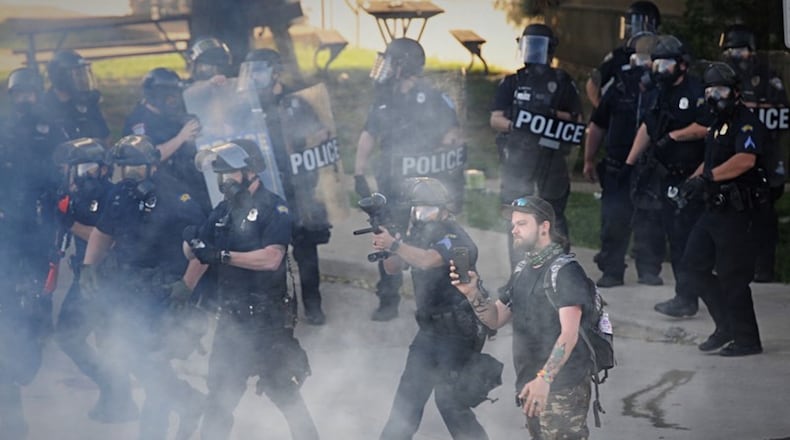Both charges in these cases were fourth-degree misdemeanors that carry the same penalties, but on paper disorderly conduct seems less severe, said Julia Mauk, misdemeanor division manager with the Montgomery County Public Defender’s office.
“All of the charges that the defendants plead to or were found guilty of are able to be expunged or sealed under Ohio law,” she said.
Several cases tied to May protests are still pending trial, including at least one involving more serious felony charges.
Dayton police said they arrested 36 people during the protests in downtown Dayton over Memorial Day weekend last year that were sparked by the killing of George Floyd at the hands of law enforcement in Minnesota.
The police department said protestors were arrested on a variety of charges including misconduct at an emergency, failure to disperse, riot, disorderly conduct, carrying concealed weapons, aggravated robbery and felonious assault.
Dayton Municipal Court records show that 13 of the defendants pleaded guilty to disorderly conduct, which were amended from original counts of misconduct at an emergency. A few of these defendants had other charges withdrawn, like riot and obstructing official business.
Disorderly conduct generally indicates an infraction that was not physical in nature and did not pose a threat to anyone, said Mauck, whose office represented multiple people arrested during the protests.
By comparison, she said, misconduct at an emergency means the defendant hampered or impeded a law enforcement officers’ duties during an emergency.
Most of the people arrested during the protests who were represented by the public defender’s office wanted to resolve their cases as quickly as possible, because they were eager to move on and didn’t want to keep coming back to court, Mauk said.
Generally, disorderly conduct convictions, as a minor misdemeanor or a fourth-degree misdemeanor, are not considered serious criminal convictions, she said.
A year after these cases are closed or terminated, the defendants can file to have the cases sealed as long as they are eligible, which usually means they have no other pending criminal or traffic cases or other disqualifying prior convictions on their records, Mauk said.
Police reports show officers made arrests after some people allegedly did not follow their commands to move back, disperse or leave the area when a curfew went into effect, according to Dayton police reports.
One woman was arrested for allegedly trying to take riot shields away from officers.
Others were arrested for allegedly fighting with police. One protestor allegedly tried to steal an officer’s bike.
One man allegedly charged officers, while another blocked a police cruiser.
A few protestors were arrested after allegedly picking up and tossing tear gas canisters at officers. Multiple people were arrested after allegedly threatening or taunting officers.
A 24-year-old Dayton man was arrested and later charged with felony aggravated robbery, as well as misdemeanor counts of resisting arrest, obstructing official business and misconduct at an emergency.
The indictment alleges the defendant tried or did take a deadly weapon away from a law enforcement officer. His case is still pending, and so are several others.
Stephanie Cook, the city of Dayton’s chief prosecutor, declined to comment for this article, saying there are still several cases open and it’s not appropriate to make remarks at this time.
Some community members harshly criticized law enforcement’s response to the protests, saying it was heavy handed and officers unnecessarily used force against mostly peaceful protestors, including pepper spray, chemical irritants and bean bag rounds.
Some citizens filed complaints alleging officers fired rounds and chemical agents at peaceful protestors who were following the law, dispersing or who were not threat to public safety.
Barbara Doseck, Dayton’s law director, said protestors threw water bottles, rocks and other objects at officers, and they caused property damage downtown, injuries to some officers and tried to get on the freeway, which could have created a dangerous situation.
Dayton protest arrests by race
Black: 16
White: 19
Unknown: 1
Source: Dayton Police
About the Author



